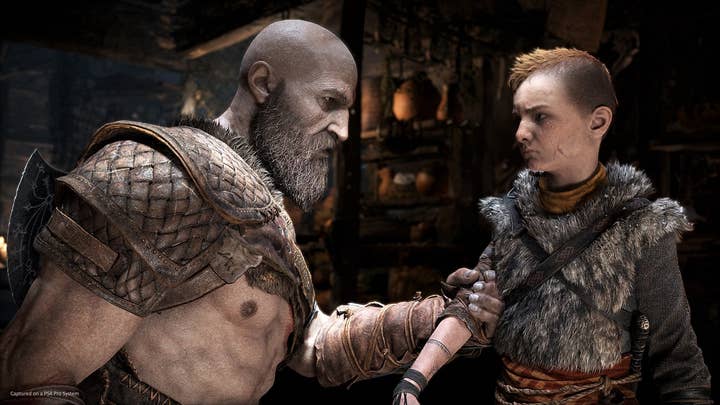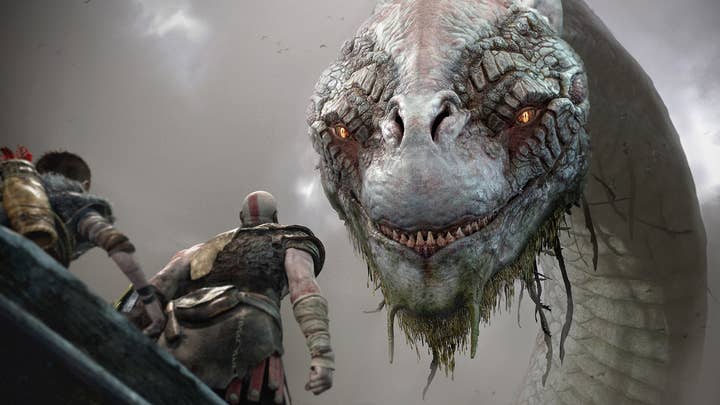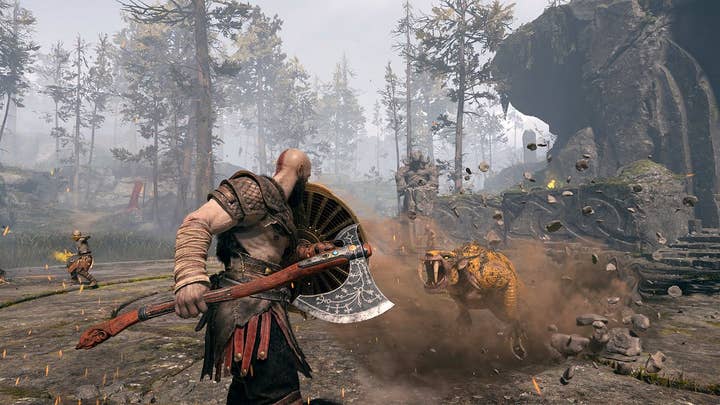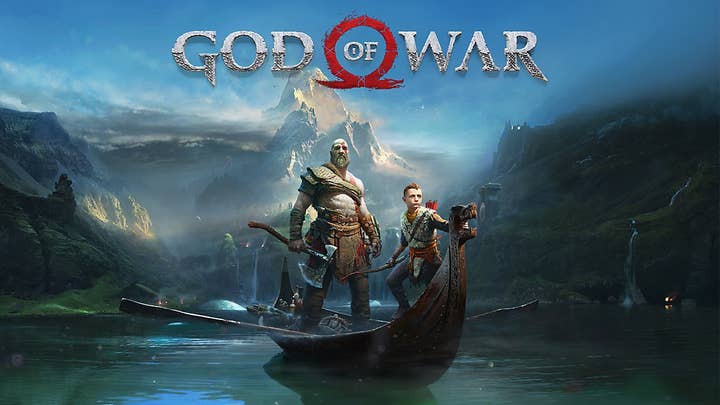How God of War converted a non-believer
Why I Love: Double Eleven's Matt Dunthorne says the 2018 revamp turned him from uninterested onlooker into full-on fanboy
Why I Love is a series of guest editorials on GamesIndustry.biz intended to showcase the ways in which game developers appreciate each other's work. This entry was contributed by Double Eleven lead game designer Matt Dunthorne.
When I picked up God of War last year, I did so as a total newcomer to the franchise. I knew about God of War obviously; I'd heard amazing things about its quick flowing combat and battles of ridiculous earth-shattering scale, but... "Hack 'N' Slash" simply wasn't my cup of tea. So, for me, it was relegated to a dark and dusty corner of my mind along with Devil May Cry, Dynasty Warriors, and Bayonetta.
But, as the pre-release hype got into full swing and I saw more and more gameplay clips, I started to reconsider my stance on this previously overlooked franchise. This didn't look like the God of War I'd seen before: What's this lovely close camera angle? What's this big meaty axe that you need to aim and throw? Who's this boy Kratos is looking after..? So many questions!
As I looked deeper into the details, I was blown away by the work of the devs at SIE Santa Monica Studio. I was in awe of how much they were willing to rewrite the DNA of a beloved series to bring it to a new generation (in my case, an old one, too).
As you might have guessed, when I actually played the game I was seriously impressed, instantly hooked, and fully engrossed in this rich and detailed world. By the time I finished it, I was full-on fanboying to anyone who would listen. I could honestly talk about hundreds of the brilliant things this game does here, but I've decided to focus on just three. (Warning, spoilers ahead.)
So let's talk about why I love God of War.
A Man and His Boy

When God of War came out, I had just become a father and was trying to get my head around the whole "What does a dad actually do?" thing. To say the story of Kratos, his son and their journey together affected my sleep-deprived, emotionally battered mind would be a massive understatement. At times, the fragile bond between these two characters was almost too much to take.
The key to why the story works so well for me comes down to two things; the clear yet effective goal of the quest and the organically growing relationship between the two main characters.
"By the end of the game, Kratos and Atreus have grown an incredible amount, both individually and as a family"
To massively oversimplify things; the game is a glorified A-Z delivery mission... it's just that well, you are delivering the ashes of your dead wife / mother to her family's resting place in the realm of the giants. It's pretty heavy stuff. The most impressive thing for me is that, in any other game, this could end up being merely a starting point and along the way the heroes get wrapped up in an adventure that takes them here, there, and everywhere, and ultimately becomes forgotten. In God of War however, this goal, which is given to you in the first 10 minutes, is the constant driving force of everything that happens thereafter. You awaken a giant serpent, befriend dwarves, fight demi-gods, battle dragons and much more, but it's always in service of Kratos' goal of fulfilling his wife's wishes. Everything comes back to that core driving force and it's so refreshing to experience.
It's this foundation that allows our two protagonists' relationship to bloom so effectively. It's safe to say that Kratos isn't a very hands-on father when we meet him; he barely has a relationship with his son Atreus. Then suddenly, with the death of his wife, he is given no choice but to take his son under his massive, muscular wing.
Atreus has just lost his mother. He is hurt, he needs direction, he looks to Kratos for guidance... but Kratos doesn't have a clue how to be a parent and resorts to teaching the boy what he knows best; fighting. Through this training, Atreus gains the respect of his dad and starts to crack his gruff exterior, getting him to open up about his past and how he met his mother.
By the end of the game, Kratos and Atreus have grown an incredible amount, both individually and as a family, with the player witnessing everything firsthand. It's such an amazing ride and packs a huge emotional punch.
An Open-ish World

It's not hard to imagine that the developers of God of War might have been under pressure to make this new entry in the series the biggest and best ever and embrace the industry trend of massive open worlds. However, what they implemented instead is what I would call an 'open-ish world', one that gives players the best bits of an open world (a sense of scale, player choice, exploration, side-quests, etc.) without the major downfalls (endless map clutter, a lack of direction, repetitive environments, boring filler quests).
The world map is a hub-and-spoke design with the hub taking the form of a large, open lake at the heart of the map, which can be explored via boat as much or as little as the player wants. The spokes are more linear paths that usually end in a 'dungeon' or a set-piece area.
"There are tons of side activities to complete along the way, but... you are never overwhelmed by a map full of icons"
The player is guided to the next location to continue the story, but they are free to take their time getting there. There are tons of side activities to complete along the way, but the designers have been much more restrained than those of other open world games and as a result, you are never overwhelmed by a map full of icons. Each time you complete the next part of the story you end up back at the lake, which expands each time with new islands to explore or new paths to travel down. These changes to the hub aren't just gates opening either, we are talking a huge bridge that the player learns they can freely rotate or asking the impossibly massive Jörmungandr (the mythical World Serpent) if he would kindly move his hulking body out of the way a bit. It's so creative.
Another lovely touch is a fast travel system which is locked off from the player for much longer than you would expect in an open world game, this decision makes the world feel huge right up until the end of the game but still allows players to get around quickly when the quest is complete and they want to mop up the side quests. It helps that the hidden, interactive loading screen is an absolute pleasure to use; it's like an evolution of the Mass Effect elevator.
...and My Axe!

Possibly the most important aspect of the design for a combat-based game is the... combat. Unsurprisingly, the devs knocked this out of the park too with what might be the greatest video game weapon of all time: the Leviathan Axe!
"When Kratos swings [his axe], you can feel the atoms in its path splitting"
This axe, man. When Kratos swings it, you can feel the atoms in its path splitting. When he throws it, you can practically feel the shockwaves coming at you through the screen. It embeds itself in the skulls of draugr with the force of two tectonic plates colliding and, quite fittingly, it makes you feel like an all-powerful god (of war). Throughout the course of the game you must throw this thing thousands of times and it just never gets boring.
The real meat of the combat, what really sets it apart, is the decision to make throwing the axe and recalling the axe, two separate actions. The player focuses and aims their axe (much like you would in an FPS which is cool in of itself) and then presses the attack button to chuck it. This causes it to get stuck in whatever it lands in, be it the torso of an enemy or a bit of scenery. It'll stay there indefinitely, lodged deep, until the player presses the recall button and magically recalls the axe to Kratos' hand, Thor style, with just as much force as when it was thrown.
The possibilities with this system are incredible, picture this: you are surrounded by enemies, they are closing in on you, you throw your axe at one of them and it sticks, you sprint at them and dodge through the crowd, as you turn to face then once more, the axe-laden enemy is at the back of the pack, you hit recall and the axe flies through the pack dealing tons of damage on it's way back to you, the enemies are dead and you feel immortal.
Situations like this happen constantly, you start reading the battlefield like a snooker player reads the table, it's all moving quickly to find angles, maximizing damage with each throw and recall. For me it's one of the most satisfying combat systems I've ever played and I haven't even mentioned standard close-quarters combat, multiple upgradable skill trees, blocking and parrying, Atreus' array of support techniques. Oh my god! Towards the end of the game you find Kratos' Blades of Chaos! YOU CAN SWITCH BETWEEN THE AXE AND THE BLADES AT THE PRESS OF A BUTTON AND EVERYTHING GETS EVEN MORE CRAZY!!! *Breathes Erratically*
God of Phwoar
So that's why I love God of War. It's a brand new direction for a beloved series which wasn't afraid to rip up all the rules. It has an incredible story set in a rich fantasy world with characters that grow as you progress. The open world is perfectly measured with zero fluff and it has the greatest combat I've ever experienced. It's a once-in-a-(console)-generation work of art that everyone should play.
I can't wait to see what comes out of Santa Monica next, and if the teases for the sequel at the end of the game are anything to go by, it's going to be incredible.
Developers interested in contributing their own Why I Love column are encouraged to reach out to us at news@gamesindustry.biz.
